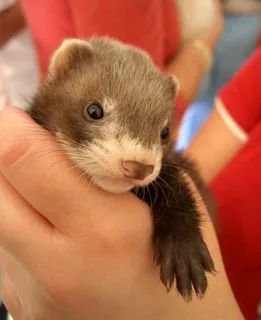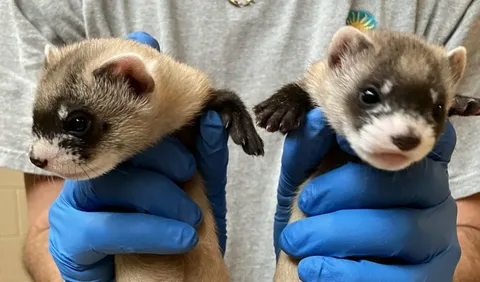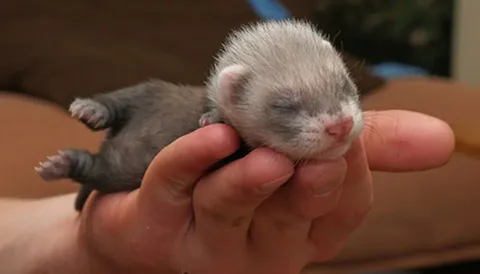Discover 15 fun and surprising facts about baby ferrets. Learn how these curious kits grow, play, and bond with humans. Perfect for pet lovers and first-time ferret owners!

Introduction
Baby ferrets, also known as kits, are tiny bundles of energy, curiosity, and cuteness. From their rapid growth to their playful personalities, there’s so much more to them than meets the eye. Whether you’re a new owner or just a ferret fan, learning about their early stages helps you appreciate these clever little creatures even more. Let’s dive into some fascinating facts about baby ferrets that will surprise and delight you!
Baby Ferrets Are Called “Kits”
Just like baby cats are called kittens and baby dogs are called puppies, baby ferrets are called “kits.” This term is used from birth until they reach about 3–4 months of age. Kits are born completely dependent on their mother, and during their early weeks, they experience rapid growth and development.https://furryferrets.com/baby-ferret-care-guide/

They’re Born Deaf and Blind
At birth, kits are blind, deaf, and nearly hairless, much like puppies. Their eyes and ears are sealed shut, and they rely entirely on their mother’s warmth and milk. By three weeks old, their eyes begin to open and they start becoming aware of their surroundings. Their sense of smell is the first to develop and helps them locate their mother.
Kits Grow Fast
Don’t let their small size fool you—kits grow astonishingly fast. In just 6 to 8 weeks, they transition from helpless newborns to weaned, energetic explorers. By this time, they’re eating solids, playing actively, and ready to begin interacting with humans. Proper nutrition during this growth period is vital to ensure strong bones, a healthy coat, and a robust immune system.

They Sleep a LOT
Kits are known for being sleep champions, snoozing between 18 to 20 hours a day. This is perfectly normal and essential for their development. The short bursts of energy they exhibit while awake are intense, but once they’re done playing, they crash hard. Don’t be alarmed if your kit seems lazy—they need that rest to grow!
They’re Extremely Playful
One of the most lovable traits of a baby ferret is its boundless playfulness. Kits love to wrestle, pounce, chase, and explore everything in sight. You’ll often see them performing the infamous “weasel war dance”—a goofy series of sideways hops, arching backs, and enthusiastic head shakes. It’s their way of showing pure joy and excitement.

Biting Is a Normal Phase
As baby ferrets learn about their world, they explore it with their mouths. Nipping and biting are normal behaviors during teething and social development. However, it’s important to train them gently using redirection and rewards to discourage hard biting. Never hit or shout—it can scare them and break their trust. Teaching bite inhibition early leads to a well-behaved adult ferret.

Kits Love to Hoard
Even at a young age, kits display the classic ferret hoarding behavior. They’ll stash toys, food, socks, or anything they find interesting into their favorite hiding spot. This instinct harks back to their wild relatives who stored food to survive. It’s harmless and entertaining—just remember to check their stash if something goes missing!
They Need to Be Socialized Early
Like puppies, early socialization is critical for baby ferrets. Between 8 and 16 weeks is a crucial window where they learn to trust humans, become familiar with household noises, and get used to being handled. Gently handling your kit daily, exposing them to different people and safe pets, and letting them explore (under supervision) will result in a confident and friendly adult.

They Can Be Litter Trained
Yes, it’s possible—and highly recommended—to litter train your baby ferret. Start by placing litter boxes in every corner of their play area or cage, as ferrets tend to go where it’s convenient. When you see your kit using the box, reward them with treats and praise. Over time, they’ll learn to associate the litter box with the right behavior. Accidents will happen, but consistency is key.
Diet Is Crucial for Growth
Baby ferrets require a high-protein, high-fat diet because they are obligate carnivores. Their bodies are designed to digest animal-based proteins efficiently. Look for ferret-specific kibble or raw diets formulated for growth. Avoid feeding dog or cat food, fruits, vegetables, or dairy—these can lead to nutritional deficiencies or digestive issues. Offer fresh water at all times and consult a vet for personalized feeding advice.
They Need Vaccinations
Just like puppies and kittens, ferret kits need vaccinations to protect against diseases. The most important vaccine is against canine distemper, which is deadly to ferrets. Start vaccinations around 6–8 weeks of age with boosters every 3 weeks until they’re 14 weeks old. A rabies vaccine is also essential, typically administered at 12–16 weeks. Regular vet visits help ensure your ferret stays healthy.

They Are Illegal in Some Places
Before you adopt a baby ferret, check your local regulations. Ferrets are illegal or restricted in certain regions like California, Hawaii, and parts of New York. These bans are often based on outdated concerns about them becoming invasive species or posing health risks. Owning an illegal pet can result in confiscation or fines, so always confirm the law in your area.
They Thrive in Pairs or Groups
Ferrets are extremely social animals, and baby ferrets especially benefit from the companionship of another ferret. Kits raised in pairs tend to be happier, more playful, and better adjusted. They teach each other manners through play and keep each other entertained when you’re away. If possible, consider adopting two kits together—it’s double the fun and a great way to reduce behavioral issues.
They Can Be Trained Like Puppies
Don’t underestimate your kit’s intelligence! With patience and consistency, baby ferrets can be trained to respond to their name, use a litter box, walk on a leash, and even perform tricks. Use positive reinforcement—like treats, gentle praise, or play—to encourage good behavior. Avoid punishment, as it can create fear and stress. Training is also a great way to bond with your pet.
Baby Ferrets Can Live 6–10 Years
Ferrets have a relatively long lifespan for small mammals. With proper care, baby ferrets can live between 6 to 10 years, or even longer in some cases. Owning a ferret is a long-term commitment that involves proper nutrition, veterinary care, daily interaction, and a safe environment. If you’re ready to put in the effort, you’ll have a loving and hilarious companion for years.
Final Thoughts
Baby ferrets are full of energy, mischief, and love. While they may be small, the amount of attention and care they need is significant. From proper diet and socialization to early training and enrichment, raising a baby ferret is both a challenge and a joy.
But if you’re willing to embrace their quirks and meet their needs, a baby ferret can grow into one of the most affectionate, funny, and loyal pets you’ll ever own.
FAQ
FAQ 1: What do baby ferrets eat?
Baby ferrets, or kits, require a high-protein, high-fat diet to support their rapid growth. Between 6–8 weeks old, they should be weaned onto a ferret-specific kibble or a carefully balanced raw meat diet. Avoid dog or cat food, as it lacks the proper nutrients. Kits also need fresh water available at all times, and small, frequent meals throughout the day. Always consult a vet before changing a kit’s diet.
FAQ 2: Can you train a baby ferret to use a litter box?
Yes! Litter training a baby ferret is very possible with patience and consistency. Start by placing shallow litter trays in every corner of their play area or cage. Ferrets often choose corners to eliminate. When your kit uses the box, praise and reward them. If accidents happen, gently guide them to the box. Over time, they will associate the litter box with the right behavior.
FAQ 3: How do I stop a baby ferret from biting?
Biting is a normal stage in baby ferret development, especially during teething. To discourage biting, never yell or hit—instead, use gentle redirection. Say “No” firmly, offer a toy as a substitute, or end playtime briefly to show that biting leads to less fun. Consistent handling, socialization, and positive reinforcement help kits learn bite inhibition and become well-mannered adults.
